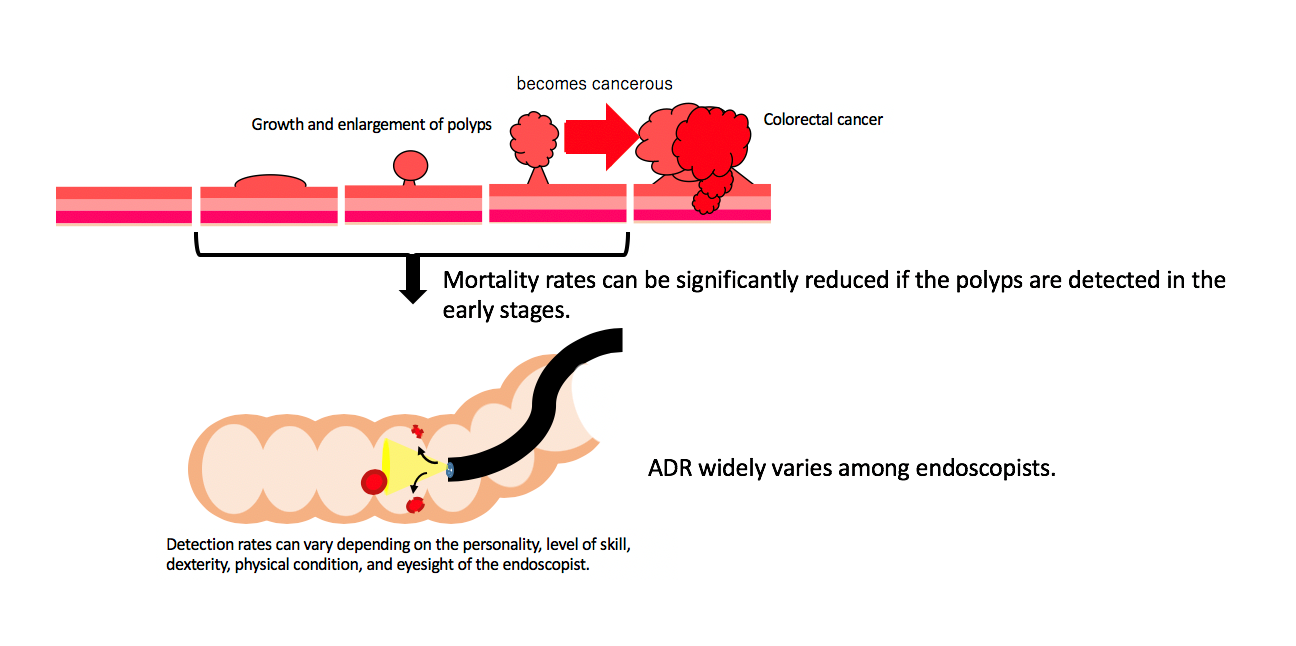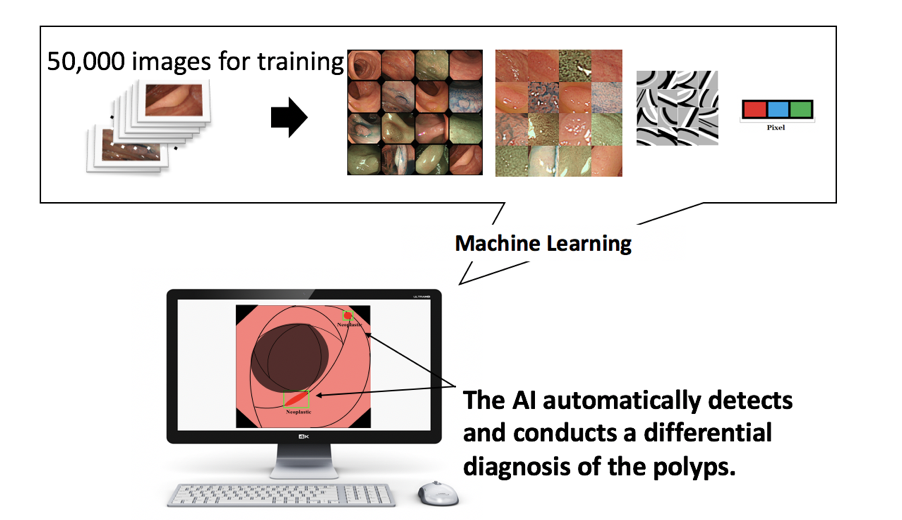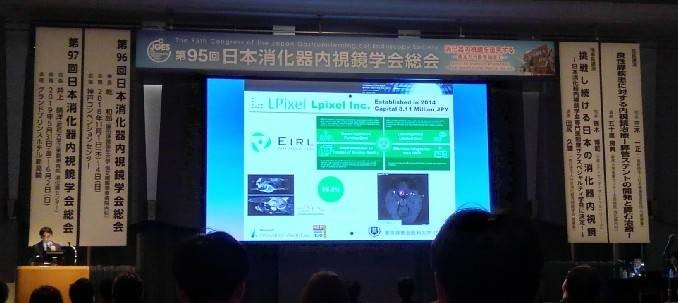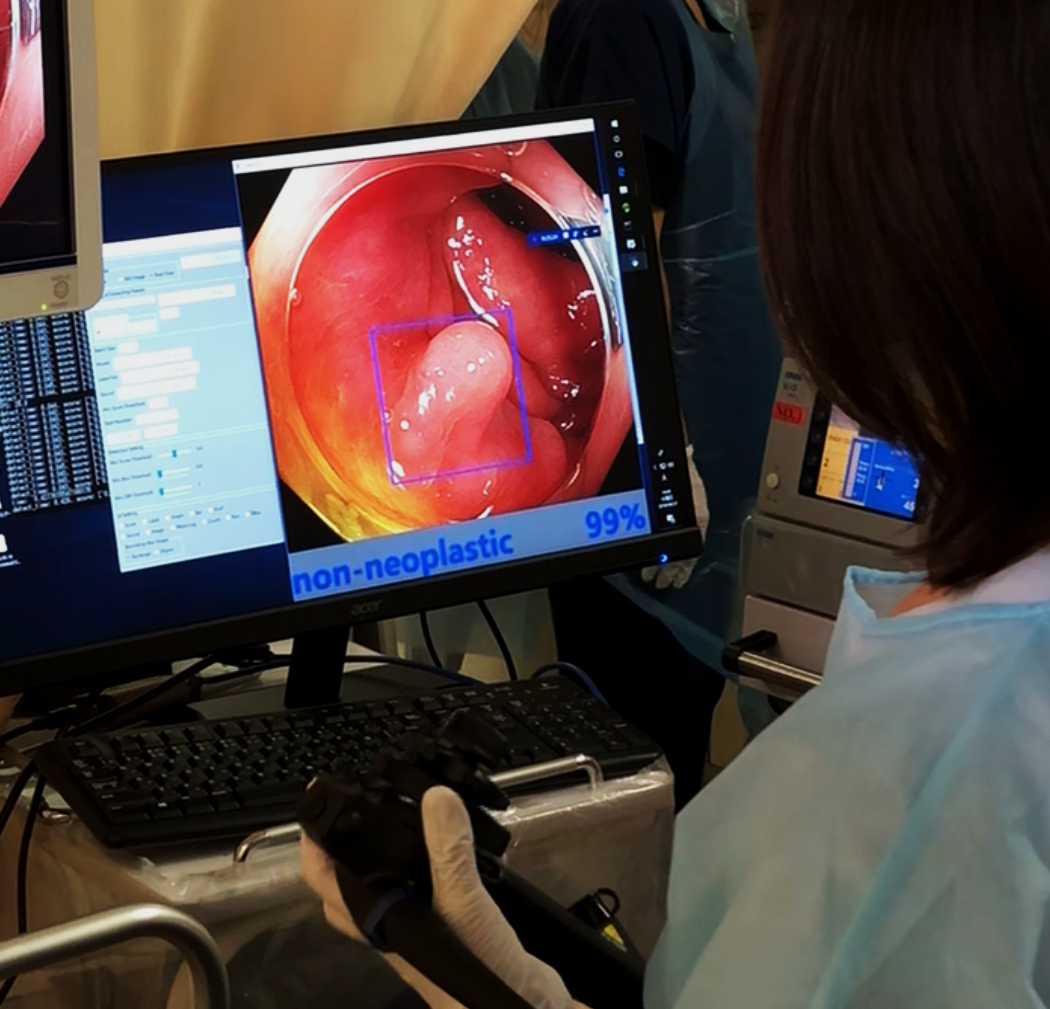- NEWS
- Press Release
AI-Assisted Colonoscopy Works Alongside Endoscopists to Minimize Deaths Related to Colorectal Cancer
Overview of Research
・This research focuses on the development of an artificial intelligence (AI)¹ system to assist endoscopists in the detection and the differential diagnosis of colonic lesions in real-time during routine colonoscopy.
・The training data for the AI is comprised of approximately 50,000 images of colonic lesions of various shapes, sizes and pathologies.
・The system achieved a sensitivity² of 98% and a positive predictive value³ of 91.2%.
・ For the detection of “difficult lesions,” which are flat or diminutive polyps that are hard to find for endoscopists, the sensitivity and positive predictive value were 93.7% and 96.7%,respectively.
l・The AI is anticipated to lower the risk of colorectal cancer by reducing the number of overlooked lesions and misdiagnosed cases.
The results of this research were presented during the symposium at the 95th Annual Meeting of the Japan Gastroenterological Endoscopy Society, which took place on May 11th, 2018. It was also presented at Digestive Disease Week (DDW) 2018, which was held on June 2nd, 2018 in Washington DC.
This research is funded by the Japan Agency for Medical Research and Development. LPixel is a joint research partner to the Jikei University School of Medicine.
Background
The incidence and mortality of colorectal cancer have been steadily increasing in Japan [1]. In order to improve prevention and treatment outcomes of the disease, it is important to detect and resect the precursors (adenoma or polyp) and the disease at an early stage of during colonoscopy [2]. The effectiveness of colonoscopy in colorectal cancer prevention could be influenced by the adenoma detection rate (ADR) of each endoscopist. A preceding study demonstrated that the incidence of colorectal cancer may be reduced by 3% for every 1% increase in ADR [3]. ADR, however, widely varies among endoscopists. With the growth of the aging population in Japan, the incidence of colorectal cancer is predicted to increase among the age group with high prevalence of the disease.
Although boosting endoscopist training and distributing high-end modalities may be reasonable actions, both options are time-consuming, labor-intensive, and create a considerable amount of economic burden. The Jikei University School of Medicine and LPixel will approach this problem by developing an AI system capable of efficiently and accurately detecting colorectal lesions regardless of the endoscopists’ skill and knowledge. The system is designed to be compatible with a variety of colonoscopy systems that are currently being used.

Achievements
The system under development is trained with approximately 50,000 images of colonic lesions provided by the Jikei University Hospital. Based on the data gathered from training, the system will assist the endoscopist by automatically detecting and predicting the differential diagnosis of the colonic lesions in real-time. As part of development, a machine learning technique known as deep learning4, is implemented to the system. Deep learning is known for its effectiveness in object detection.
As of May 2018, the system achieved a sensitivity of 98% and a positive predictive value of 91.2% for the detection of colonic lesions. Even for the detection of “difficult lesions,” which are flat or diminutive lesions, the sensitivity and the positive predictive value were 93.7% and 96.7%, respectively.

The results of this research were presented during the symposium at the 95th Annual Meeting of the Japan Gastroenterological Endoscopy Society, which took place on May 11th, 2018. The presentation was titled, “The Detection and Differential Diagnosis of Colonic Lesions with an Artificial Intelligence Algorithm.” It was also presented at Digestive Disease Week (DDW) 2018, which was held at Washington DC on June 2nd, 2018. DDW is the largest gathering of over 14000 physicians and researchers in the field of gastroenterology.

The 95th Congress of the Japan Gastroenterological Endoscopy Society held on May 11th, 2018.
Future Outlook
Given the steady progress in research and development, the endoscopy team at the Jikei
University Hospital has installed the system on-site and is currently conducting clinical trials to evaluate the performance of the system for further improvement. The scope of the clinical trials will be further amplified in the following year, as the team will be collaborating with the National Cancer Center to confirm the effectiveness of the system. This project is anticipated to make quality colonoscopy accessible to a wider range of patients faster, and make a significant contribution to the early discovery, treatment, and efficient prevention of colorectal cancer.

A snapshot of the system being used during a clinical trial at the Jikei University Hospital. The AI automatically detects and highlights the polyp in real-time with a bounding box. The AI also informs the endoscopist whether the polyp is neoplastic or non-neoplastic, along with its confidence level. In this case, the polyp is non-neoplastic with a confidence level of 99%.
Terminology
¹ Artificial Intelligence
A branch of science that uses computers to simulate the intelligent behavior of humans
Taken from “Jinkō chinō towa (What is AI?)” Kindaikagakusha (2016) ISBN:978-4764904897
² Sensitivity
The rate at which the AI was able to correctly identify the existing lesions
³ Positive predictive value
The rate at which the polyp identified by the AI was actually a polyp
4 Deep learning
A method of acquiring an internal representation with a high degree of abstraction from data by using multiple neural networks (deep neural network: DNN).
Taken from the Journal of Japanese Society for Artificial Intelligence 28(4), 649-659, 2013-07-01
References:
[1] Statistics on the Prevalence of Cancers (National Cancer Center)
http://ganjoho.jp/reg_stat/statistics/stat/short_pred.html
[2] Zauber AG, et al. N Engl J Med.2012 Feb 23;366(8):687-96.
[3] Corley DA, et al. N Engl J Med.2014 Apr 3;370(14):1298-306.
General Inquiries
For more information, please contact the following:
The Jikei University School of Medicine
Department of Endoscopy
Kazuki Sumiyama, Professor
Nishi-shinbashi 3-25-8, Minato-ku, Tokyo, 105-8461
TEL: 03-3433-1111 (Ext 3180)
The Jikei University School of Medicine
Division of Public Relations
Nishi-shinbashi 3-25-8, Minato-ku, Tokyo, 105-8461
TEL: 03-5400-1280
LPixel Inc.
Public Relations
TEL: 03-6327-3992
Email: pr@lpixel.net
Inquiries Regarding the Project
Japan Agency for Medical Research and Development (AMED)
Department of Research Promotion
Division of Cancer Research
Otemachi 1-7-1, Chiyoda-ku, Tokyo, 100-0004
TEL: 03-6870-2221
E-mail: cancer@amed.go.jp